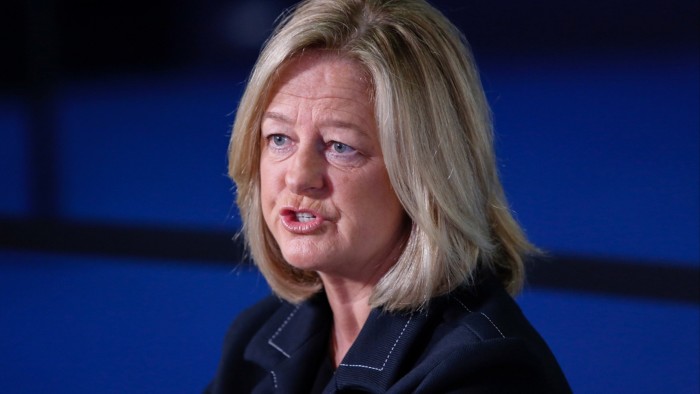Unlock the Editor’s Digest for free
Roula Khalaf, Editor of the FT, selects her favourite stories in this weekly newsletter.
Allison Kirkby said advances in artificial intelligence could deepen significant job cuts under way at BT, as the chief executive of the UK telecoms group opened the door to a possible future spin-off of Openreach.
Kirkby told the Financial Times that BT’s plans to cull more than 40,000 jobs and strip out £3bn of costs by the end of the decade “did not reflect the full potential of AI”.
If AI presented new opportunities for BT to run the business with fewer resources, Kirkby said it would need to adapt to remain competitive.
“Depending on what we learn from AI . . . there may be an opportunity for BT to be even smaller by the end of the decade,” she said in an interview.
Since taking over in February last year, Kirkby has doubled down on her predecessor Philip Jansen’s plans announced in 2023 to cut up to 55,000 jobs by 2030.
She has refocused BT on the UK, selling off its Italian business and its Irish wholesale and enterprise division.
The FTSE 100 company last month carved out the group’s international business into a separate unit and is open to offers for the entire division, said a person familiar with the matter.
Investors including Indian billionaire Sunil Mittal, who owns a 24.5 per cent stake, have welcomed Kirkby’s efforts to streamline the former state monopoly. BT’s shares have rallied 65 per cent since she took over as chief executive.
Kirkby, who served on BT’s board as a non-executive director before becoming chief executive, said she did not feel the value of Openreach was reflected in the company’s share price. If that situation persisted, the chief executive said BT “would absolutely have to look at options”.
She said “the time to reconsider” whether to spin off Openreach would be once it had finished upgrading its network to full fibre. At that point, its capital expenditure will reduce to normal levels and its free cash flow will rebound.
Openreach’s build-out of the network will slow once it serves 25mn homes, a target it expects to hit next year. After that point the company will slow the build-out to about 1mn homes a year, down from the current pace of 1mn homes a quarter. BT aims to reach 30mn homes with Openreach by 2030.
Analysts at New Street Research estimate Openreach’s current value to be about £30bn, well in excess of BT’s current market value of £18.5bn.
Kirkby said her preference was to get the value of the network reflected in BT’s shares, rather than spin it off.
BT’s chief wants to exploit the disruption caused by the recent £16.5bn merger of Vodafone and Three, which has created a new market leader in UK mobile, to grow BT’s retail brands, EE and Plusnet.
“Clearly when competition goes through disruption . . . that is an opportunity for us to be able to promote the benefits of our brands and services versus others,” she said.
Kirkby said she would consider running BT’s retail brands on an altnet in areas of the UK where it was uneconomical for Openreach to build out its own fibre network.
The outcome of last week’s spending review led economists to predict chancellor Rachel Reeves will raise taxes further.
Kirkby, who estimated increases in employers’ national insurance would cost BT more than £100mn, warned “the last thing we all need is to be further taxed”.
BT’s chief, who grew up in working class Glasgow and advises the business department’s board of trade, added the Labour government was “working very proactively” with business.
“It takes time to turn around an economy that has been impacted by a number of shocks.”




